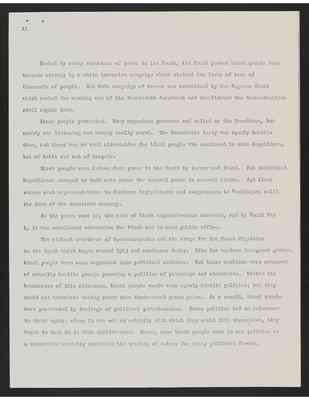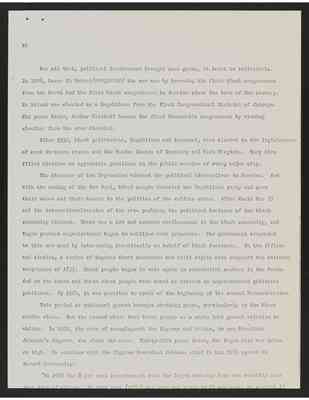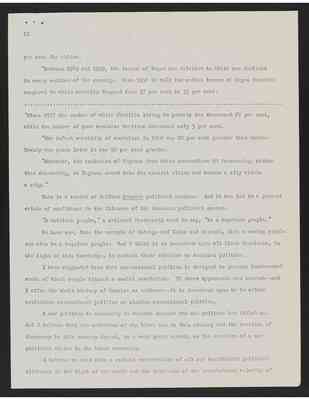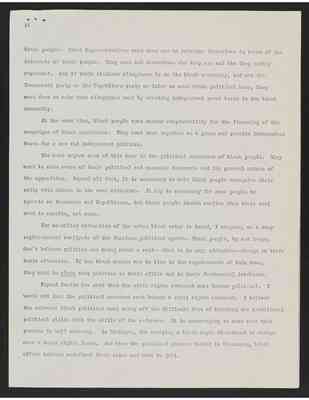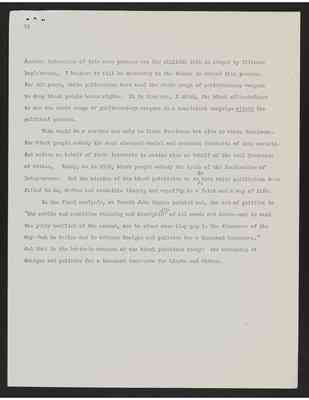Pages
11
11
Backed by every structure of power in the North, the South pushed black people back towards slavery by a white terrorist campaign which claimed the lives of tens of thousands of people. And this campaign of terror was sanctioned by the Superme Court which sucked the meaning out of the Fourteenth Amendment and invalidated the Reconstruction civil rights law.
Black people protested. They organized protests and called on the President, but nobody was listening and nobody really cared. The Democratic Party was openly hostile then, and there was no real alternative for black people who continuted to vote Republican, but of habit and out of despair.
Black people were driven from power in the South by terror and fraud. But individual Republicans managed to hold onto power for several years in several states. And black voters sent representatives to Southern legislatures and congressmen to Washington until the dawn of the twentieth century.
As the years wore on, the area of black expressiveness narrowed, and by World WAr 1, it was condidered subversive for black men to hold public office.
The violent overthrow of Reconstruction set the stage for the Great Migration to the North which began around 1913 and continues today. Like the various imigrant groups, black people were soon organized into political machines. But these machines were composed of mutually hostile groups pursuing a politics of patronage and stalemates. Within the boundaries of this situation, black people would veto openly hostile policies; but they could not translate voting power into fundamental group gains. As a result, black people were penetrated by feelings of political powerlessness. Since politics had no revelance to their agony, since it was not an activity with which they could lift themselves, they began to look on it with indifference. Worse, some black people came to see politics as a marketable activity involvin the trading of voters for petty political favors.
12
12
For all that, political involvement brought some gains, at least to individuals. In 1928, Oscar De Priest inaugurated the new era by becoming the first black congressman from the North and the first black congressman in America since the turn of the century. De Priest was elected as a Republican from the First Congressional District of Chicago. Six years later, Arthur Mitchell became the first Democratic congressman by winning election from the same district.
After 1930, black politicians, Republican and Democrat; were elected to the legislatures of most Northern states and the Border States of Kentucky and West Virginia. They also filled elective or appointive positions in the public service of every major city.
The disaster of the Depression widened the political alternatives in America. And with the coming of the New Deal, black people deserted the Republican party and gave their votes and their hearts to the politics of the welfare state. After World War II and the internatiuonalization of the race problem, the political horizons of the black community widened. There was a new and ominous rentlessness in the black community, and Negro protest organizations began to mobilize mass pressures. The government responded to this new mood by intervening dramatically on behalf on black Americans. In the fifties and sixties, a series of Supreme Court decisions and civil rights sets reopened the national compromise of 1877. Black people began to vote again in substanial numbers in the South. And in the South and North black people were named or elected to unprecedented political positions. By 1960, it was possible to speak of the beginning of the second Reconstruction.
This period of political growth brought striking gains, particularly in the black middle class. But the record shows that black people as a whole lost ground relative to whites. In 1930, the rate of unemployment for Negroes and whites, to use President Johnson's figures, was about the same. Thirty-five years later, the Negro rate was twice as high. To continue with the figures President Johnson cited in his 1965 speech at Howard University:
"In 1948 the 8 per cent unemployment rate for Negro teen-age boys was actually less ten that of whites. By last year (1964) the rate had grown to 23 per cent, as against 13
13
13
per cent for whites.
"Between 1949 and 1959, the income of Negro men relative to white men declined in every section of the country. From 1952 to 1963 the median income of Negro families compared to white actually dropped from 57 per cent to 53 per cent.
................................................................
"Since 1947 the number of white families living in poverty has decreased 27 per cent, while the number of poor nonwhite families decreased only 3 per cent.
"The infant mortality of non whites in 1940 was 70 per cent greater than whites. Twenty-two years later it was 90 per cen t greater.
"Moreover, the isolation of Negroes from white communitiues in increasing, rather than decreasing, as Negroes crowd into the central cities and becomne a city within a city."
This is a record of failure despite political success. And it has led to a general crisis of confidence in the fairness of the American political system.
"A voteless people," a national fraternity used to say, "is a hopeless people."
We know now, from the example of Chicago and Watts and Detroit, that a voting people can also be a hopless people. And I think it is incumbent upon all black Americans, in the light of this knowledge, to rethink their relation to American politics.
I have suggested here thaty conventional politics is designed to prevent fundamental needs of black people without a social revolution. If these hypotheses are correct--and I offer the whole history of America as evidence--it is incumbent upon us to either revitalize conventional politics or abandon conventional poltics.
A new politics is necessary in American because the old politics has failed us. And I believe that the salvation of the black man in this country and the creation of democracy in this country depend, to a very great extent, on the creation of a new political vision in the black community.
I believe we must make a radical reevaluation of all our traditional political alliances in the light of the needs and the intercats of the overwhelming majority of
14
14
black people. Black Representatives must dare now to redefine themselves in terms of the interests of their people. They must ask themselves who they are and who they really represent. And if their ultimate allegiances is to the black community, and not the Democratic party or the Republican party or labor or some white political boss, they must dare to make that allegiance real by creating independent power bases in the black community.
At the same time, black people must assume repsonsibility for the financing of the campaigns of black candidates. They must come together as a group and provide independent bases for a new and independent politics.
The most urgent need of this hour is the political education of black people. They must be made aware of their political and economic interests and the general nature of the opposition. Beyond all that, it is necessary to make black people recognize their unity with others in the same situation. It may be necessary for some people to operate as Democrats and Republicans, but black people should realize that their real need in results, not name.
The so-called alienation of the urban black voter is based, I suspect, on a very sophisticated analiysis of the American political system. Black people, by and large, don't believe politics can bring about a real--that is to say, effective--change in their basic situation. If the black masses are to rise to the requirements of this hour, they must be shown that politcs is their affair and in their fundamental interests.
Bayard Rustin has said that the civil rights movement must become political. I would add that the political movement must become a civil rights movement. I believe the relevent black politican must carry off the difficult fact of blending the traditional political skills with the skills of the reformer. It is encouraging to note that this process is well underway. In Michigan, for example, a black mayor threatened to resign over a human rights issue. And when the political process failed in Wisconsin, black office holders redefined their roles and went to jail.
15
15 Another indication of this same process was the skillful talk-in staged by Illinous legislators, I believe it will be necessary in the future to extend this process. For 100 years, white politicians have used the whole range of parliamentary weapons to deny black people human rights. It is time now, I think, for black officeholders to use the whole range of parliamentary weapons in a nonviolent campaign within the political process.
This would be a service no only to black Americans but also to white Americans. For black people embody the most advanced social and economic interests of this society. And action on behalf of their interests is action also on behalf of the real interests of whites, Today, as in 1776 black people embody the truth of the Declaration of Independence. And the mission of the black politician is to do what white politicians have failed to do, define and actualize liberty and equality as a faith and a way of life.
In the final analysis, as Emmett John Hughes pointed out, the art of politics is "the subtle and sensitive attuning and disciplin ing of all words and deeds--not to mend the petty conflict of the moment, nor to close some tiny gap in the discourse of the day--but to define and to advance designs and policies for a thousand tomorrows." And that is the historic mission of the black politican today: the advancing of designs and policies for a thousand tomorrows for blacks and whites.
